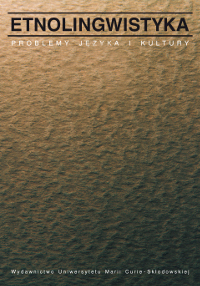Etnolingwistyka ludowa, narodowa, porównawcza - koncepcje neofilologów i polonistów
'FOLK', NATIONAL AND COMPARATIVE ETHNOLINGUISTICS: CONCEPTIONS OF NEOPHILOLOGISTS AND POLONISTS
Author(s): Anna TyrpaSubject(s): Anthropology, Language and Literature Studies, Customs / Folklore, Theoretical Linguistics, Applied Linguistics
Published by: Wydawnictwo Naukowe Uniwersytetu Marii Curie-Sklodowskiej
Keywords: DIALECTOLOGY; FOLKLORE; STEREOTYPE
Summary/Abstract: Ethnolinguistics is understood in a variety of ways. In ethnolinguistic works of neophilologists, the languages of minorities are described in relation to the languages of majorities: ethnolinguistics dovetails here with dialectology in its preoccupation with the status of certain ethnolects. In the works of Polish linguists, especially important are the connections between language and culture. Three varieties of ethnolinguistics are identified: folk, national and comparative. The first of these is typical of the linguists associated with the 'Slownik stereotypów i symboli ludowych' (A Dictionary of Folk Stereotypes and Symbols), compiled in Lublin; the second is found in the works of Gudavicius, for whom ethnolinguistics deals with 'the nation in the language'; the third type underscores the peculiarities of thinking characteristic of different nations. In the last sections of the article the authoress deals with the points of convergence between ethnolinguistics and ethnography, as well as between the former and dialectology. She also presents the figures of the pioneers of Polish ethnolinguistics.
Journal: Etnolingwistyka. Problemy Języka I Kultury
- Issue Year: 18/2006
- Issue No: 18
- Page Range: 105-116
- Page Count: 12
- Language: Polish

